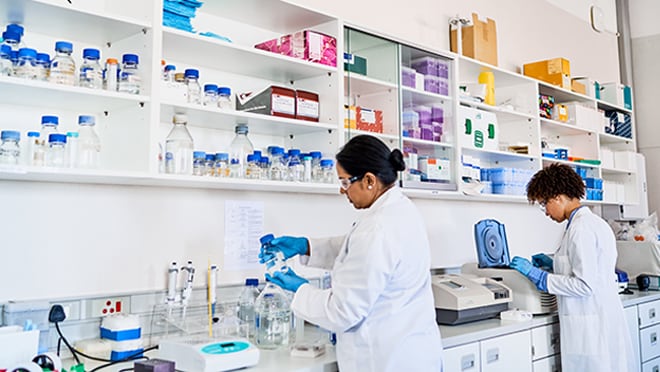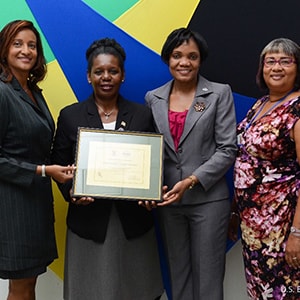At a glance
Since 2009, CDC has worked in the Caribbean region to strengthen laboratories. This has resulted in the accreditation of ten government-owned clinical laboratories, which are still operational in the Bahamas, Jamaica, Barbados, Trinidad and Tobago, and Suriname.
Improving laboratories in the region

Getty Images
Laboratories are crucial to any country's health system – critical for screening, diagnosing, and monitoring diseases like HIV and tuberculosis (TB). Since the U.S. Centers for Disease Control and Prevention (CDC) began work in the Caribbean, strengthening laboratories has been a priority.
In 2009, when the U.S. President's Emergency Plan for AIDS Relief (PEPFAR) initiated work in the region, no accredited government-owned clinical laboratories existed. Services such as rapid HIV testing and molecular testing for HIV/AIDS treatment and monitoring were not widely available. Since these services were not available locally, samples had to be shipped out of the Caribbean at great expense to the Ministries of Health.
The CDC, in partnership with PEPFAR, began providing technical assistance to laboratories across the region to strengthen these direly needed services. This ultimately led to the accreditation of ten government-owned clinical laboratories, which are still operational in the Bahamas, Jamaica, Barbados, Trinidad and Tobago, and Suriname. These laboratories have also expanded their testing capabilities to include surveillance of other infectious diseases.
Shifting the paradigm
In 2011, the Caribbean was second to sub–Saharan Africa in HIV/AIDS burden, with numbers continuing to rise. Infrastructure improvements, including laboratory services, were neglected. This exacerbated challenges in the health landscape.
With the backing of PEPFAR, the CDC Caribbean Office embarked on a mission to transform the perception of laboratory work. The goal was to place the patient at the heart of the work, demonstrating that improved diagnostics and accreditation would have a ripple effect, enhancing the delivery of life-saving interventions and services.
Innovation and accreditation
Tangible achievements in laboratory strengthening remained an uphill battle as there were varying needs across the region. However, the team was able to tailor CDC and PEPFAR strategies based on lessons learned from successful interventions in Africa, building off ideas and innovations to create a program for smaller laboratory spaces with limited resources. Two successful initiatives were geared at training dedicated laboratory mentors and delivering the Strengthening Laboratory Management Toward Accreditation Training program (SLMTA). Over the past decade, over twenty regional laboratories have participated in the program.
The dedication to improved laboratory services resulted in investments in laboratory infrastructure, establishment of new testing platforms, decentralization of services, and implementation of technology solutions for real-time data management in the region. Through these efforts, ten public sector laboratories achieved accreditation, the first in the Bahamas in 2013 and the most recent in Trinidad in 2023.
Building on successes
Today, CDC continues to work with laboratories across the region to build capacity and ensure the Caribbean has a strong public health infrastructure to support ongoing disease management while meeting the needs for emerging infections. Each country that received tailored support for laboratory capacity continues to see profound improvements in their clients' healthcare experiences. The overall progress includes:
- expanding quality assurance programs for HIV testing by 100%
- improving the quality of patient samples collected, resulting in rejection rates of less than 5%
- expanding electronic laboratory information systems, resulting in 75% less paper-based reporting
- supporting capacity building for over 5,000 technical laboratory staff across the region.

System-strengthening investments, like accreditation, can be challenging because they require a shift in mindset and to change the status quo. However, these efforts are key to ensuring sustainability.
Below, laboratory administrators share their firsthand experiences with the process of accreditation and offer lessons learned to others:

CDC continues to play an integral role in the Caribbean, as accredited labs also serve as referral labs for other countries with less capacity. By supporting others in the region, accredited labs ensure patients receive reliable and accurate results—a critical component in ending the HIV and TB epidemics.
